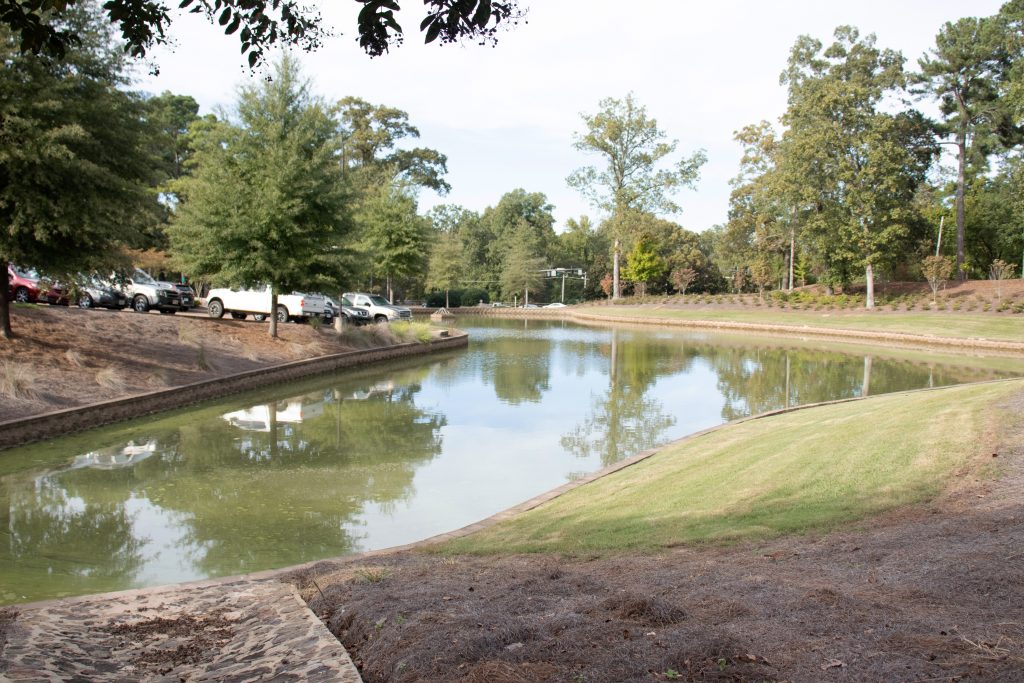Three National Pan-Hellenic Council sorority chapters briefly inhabited houses on campus in and before 2007 but haven’t had representation on Sorority Row since the Residential College was built.
The Theta Psi Chapter of Alpha Kappa Alpha, Tau Eta Chapter of Zeta Phi Beta and Lambda Sigma Chapter of Delta Sigma Theta sororities lived on Sorority Row in three former on-campus faculty houses, which stood where the east residential parking lot currently is near Silver Pond.

Silver Pond on Sorority Row is near the site of where several former NPHC houses once stood. Photo by Treviso Davis
After approximately 70 years of being on campus, those faculty members’ living spaces were relocated off campus in 2007 to a space called Community Green, an affordable housing development on Molly Barr Road for UM faculty and staff.
Assistant Provost and Associate Professor of Mathematics Donald R. Cole said planning for the Residential College began in the late 2000s.
Cole said it took time to secure funding and begin construction on the new Residential College, and then-Vice Chancellor for Student Affairs Thomas Wallace suggested three of the 21 empty faculty houses could be used for NPHC sororities until Residential College construction began.
“Administratively, this was a bittersweet move,” Cole said. “Sweet because it gave an extremely significant presence to these groups; bitter because they looked like slum houses in the midst of the other towering sorority houses.”
Sumayia Young, President of the Theta Psi Chapter of Alpha Kappa Alpha Sorority, Inc. said a common place is a necessity for every Greek organization to help unify the chapter and to provide a space for all members to meet.
“We do not have a space to call our own,” Young said. “We have to find a place to hold chapter. We have to find space to do step practice. My chapter is so big that no place can hold us.”
According to Young, it’s more difficult for an NPHC organization than it is for an Interfraternity Council or College Panhellenic organization to raise money for a house due to the smaller chapter sizes, less expensive dues and the limited alumni base for donations.
“If you look at IFC and (National Panhellenic Council), they all have big houses and big chapter numbers. Historically, our (organizations) do not produce more than 170 people per chapter,” Young said. “We need a great alumni base and the numbers to sustain.”
Last week, the university’s Epsilon Zeta chapter of Kappa Alpha Theta announced it would not be returning to campus in the spring 2019 semester. UM officials have yet to announce plans for the future of the large house on the corner of Rebel Drive and Northgate Drive.
“When we found out the news about Theta we thought this may be our opening, but then we have to deal with the dues and fees that go along with the house,” Young said.
When the NPHC sororities had to move out of the houses, sorority members and the community were upset, and those feelings still linger in some people’s minds, Cole said.
Some Northgate apartment property was offered to the groups, but Cole said the sorority chapters declined the offer because the properties were not as prominent or as versatile as the space they had formerly occupied on campus.
“(The houses) were symbolic to the presence of people of color on campus, and at the time they were the only symbols,” Cole said. “Moreover, their mere location made them visible in the public’s eye. So even if you were not a member of one of these groups but a person of color, then you appreciated their presence.”
Arthur E. Doctor, director of the Office of Fraternal Leadership and Learning, said there’s a perception that Greek organizations have a presence on campus if they have a house and said “that belief is the farthest thing from the truth.”
Doctor said NPHC chapters are extremely engaged and involved within the community and consistently host impactful programming, ranging from career development workshops, educational forums and social events that allow the community to see each chapter in a positive light.
“I believe the NPHC chapters at the university could benefit from their peers taking notice of the hard work each (chapter) does to demonstrate the impact they make on campus and within the community,” Doctor said. “Yes, they may not have a physical house on campus, but these organizations have created a sense of belonging and a home away from home, not only for their members but for thousands of students here at the University of Mississippi.”
Young said her chapter still has hopes for a future with an on-campus house and believes it would have a positive impact on the University of Mississippi.
“You look at history: James Meredith, Omega Psi Phi and Alpha Kappa Alpha,” Young said, referring to the university’s first black student and the first black Greek organizations on campus. “It would be a great progression of overall inclusiveness of the University of Mississippi.”






